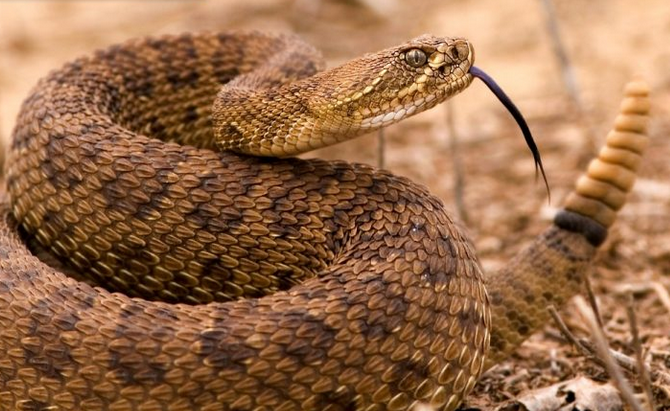 The U.S. Centers for Disease Control estimates that 7,000-8,000 people are bitten by venomous snakes annually and that a small number of those victims die. Most snake bite deaths occur in children, the elderly, or with people who do not seek medical attention. While most bites are not fatal if treated by medical professionals, getting bitten is still the stuff of nightmares— swelling and discoloration of the surrounding tissue, intense pain, itching, nausea, rapid pulse, loss of muscle coordination and weakness, not to mention the cost of antivenom. Areas around the bite may suffer tissue death. It is not uncommon for victims bitten on the fingers and toes to have them amputated. The venom of a rattlesnake is primarily a hemotoxin, meaning that it works on the blood by destroying red blood cells and disrupting coagulation. It has the potential to cause organ degeneration and generalized tissue damage. Victims of venomous bites typically show signs of envenomation within 30 to 60 minutes. It’s crucial to get to a hospital immediately! While this information should be taken seriously, it is not meant to scare anyone away from enjoying the great outdoors, rather it's a reminder of what to do if you encounter a snake.
The U.S. Centers for Disease Control estimates that 7,000-8,000 people are bitten by venomous snakes annually and that a small number of those victims die. Most snake bite deaths occur in children, the elderly, or with people who do not seek medical attention. While most bites are not fatal if treated by medical professionals, getting bitten is still the stuff of nightmares— swelling and discoloration of the surrounding tissue, intense pain, itching, nausea, rapid pulse, loss of muscle coordination and weakness, not to mention the cost of antivenom. Areas around the bite may suffer tissue death. It is not uncommon for victims bitten on the fingers and toes to have them amputated. The venom of a rattlesnake is primarily a hemotoxin, meaning that it works on the blood by destroying red blood cells and disrupting coagulation. It has the potential to cause organ degeneration and generalized tissue damage. Victims of venomous bites typically show signs of envenomation within 30 to 60 minutes. It’s crucial to get to a hospital immediately! While this information should be taken seriously, it is not meant to scare anyone away from enjoying the great outdoors, rather it's a reminder of what to do if you encounter a snake.
First, assume all snakes are venomous and leave them alone. Depending on the state you live in, there are many species of rattlesnakes— timber, prairie, canebrake, diamondback, and many others. The greatest concentration is found in the Southwestern United States and in Northern Mexico. For example, Arizona is home to 13 species of rattler, more than any other state. These snakes are commonly called pit vipers. The "pit" is an extremely sensitive organ located between the snake's eye and nostril on both sides of its head. These pits are so sensitive that the snake can detect the body temperature of a mouse, and judge its distance— whether that be a few inches or as far away as two feet. All snakes have an electrostatic sensor connected to its tongue that allows it to "taste" or chemically sense the air around it. Snakes are extremely attune to vibrations in the ground, too, so hiking with a stick or pole is a good way to “warn” snakes something is moving their way. Most pit vipers have tails with a series of rattles, hence the name rattlesnake. When rattlesnakes are disturbed, the rapid vibration of their tails will make a characteristic rattling sound to warn the intruder of their presence. However, not all rattlesnakes will “rattle” when disturbed. For this reason, when you are in rattlesnake country, pay close attention to where you walk, sit and place your hands. Wear snake gaiters or snake boots to protect your lower legs.
All venomous snakebites should be considered life-threatening.When someone has been bitten by a venomous snake, time is of the essence. Get medical help immediately! If possible, call ahead to the emergency room so antivenom can be ready when the victim arrives. Until then, keep the victim calm, restrict movement and keep the affected area below heart level to reduce the flow of venom. Wash the bite area with soap and water. Remove any rings or constricting items, as the affected area will swell. Do not apply a tourniquet, cut into the bite or try to suction out the venom, as doing so may cause more harm than good.
While no one wants to encounter a snake, keep in mind they occupy a valuable place in our ecosystem and should not be killed upon sight. They help reduce rodent populations, which destroy crops and sometimes carry diseases which can infect people. In general, snakes don't purposefully position themselves to frighten people. They'd much rather avoid encounters and usually will flee. There is no good reason to kill a snake except in the situation of a venomous snake posing immediate danger to people or pets. Snakes usually bite people only if they are molested on purpose or startled by accident; it's their only means of self-defense. Get outside this summer and have fun! Being in snake country is nothing to worry about if you take sensible precautions. Please stay alert and appreciate snakes as an integral part of wildlife.